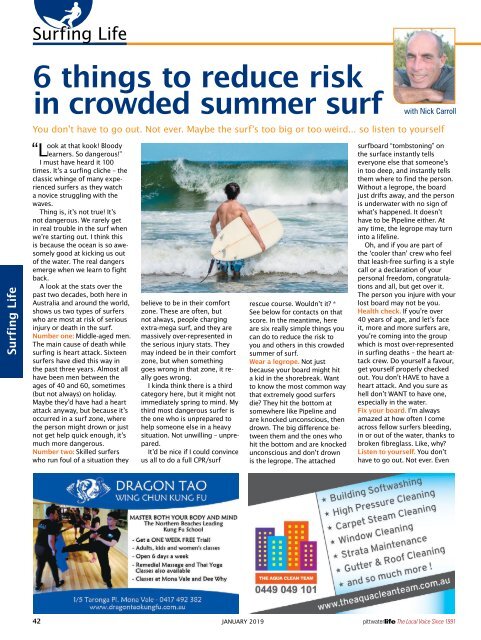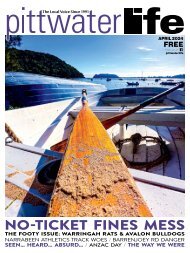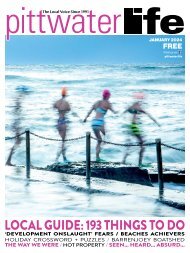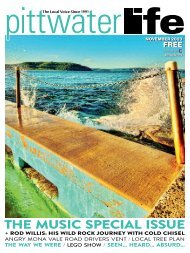Pittwater Life January 2019 Issue
Locals' Guide - 143 Things You Can Do (at the very least). So Are You Ready To Rock? 'Lifegift' Free Trial.
Locals' Guide - 143 Things You Can Do (at the very least). So Are You Ready To Rock? 'Lifegift' Free Trial.
You also want an ePaper? Increase the reach of your titles
YUMPU automatically turns print PDFs into web optimized ePapers that Google loves.
Surfing <strong>Life</strong><br />
6 things to reduce risk<br />
in crowded summer surf<br />
with Nick Carroll<br />
Surfing <strong>Life</strong><br />
You don’t have to go out. Not ever. Maybe the surf’s too big or too weird... so listen to yourself<br />
ook at that kook! Bloody<br />
“Llearners. So dangerous!”<br />
I must have heard it 100<br />
times. It’s a surfing cliche – the<br />
classic whinge of many experienced<br />
surfers as they watch<br />
a novice struggling with the<br />
waves.<br />
Thing is, it’s not true! It’s<br />
not dangerous. We rarely get<br />
in real trouble in the surf when<br />
we’re starting out. I think this<br />
is because the ocean is so awesomely<br />
good at kicking us out<br />
of the water. The real dangers<br />
emerge when we learn to fight<br />
back.<br />
A look at the stats over the<br />
past two decades, both here in<br />
Australia and around the world,<br />
shows us two types of surfers<br />
who are most at risk of serious<br />
injury or death in the surf.<br />
Number one: Middle-aged men.<br />
The main cause of death while<br />
surfing is heart attack. Sixteen<br />
surfers have died this way in<br />
the past three years. Almost all<br />
have been men between the<br />
ages of 40 and 60, sometimes<br />
(but not always) on holiday.<br />
Maybe they’d have had a heart<br />
attack anyway, but because it’s<br />
occurred in a surf zone, where<br />
the person might drown or just<br />
not get help quick enough, it’s<br />
much more dangerous.<br />
Number two: Skilled surfers<br />
who run foul of a situation they<br />
believe to be in their comfort<br />
zone. These are often, but<br />
not always, people charging<br />
extra-mega surf, and they are<br />
massively over-represented in<br />
the serious injury stats. They<br />
may indeed be in their comfort<br />
zone, but when something<br />
goes wrong in that zone, it really<br />
goes wrong.<br />
I kinda think there is a third<br />
category here, but it might not<br />
immediately spring to mind. My<br />
third most dangerous surfer is<br />
the one who is unprepared to<br />
help someone else in a heavy<br />
situation. Not unwilling – unprepared.<br />
It’d be nice if I could convince<br />
us all to do a full CPR/surf<br />
rescue course. Wouldn’t it? *<br />
See below for contacts on that<br />
score. In the meantime, here<br />
are six really simple things you<br />
can do to reduce the risk to<br />
you and others in this crowded<br />
summer of surf.<br />
Wear a legrope. Not just<br />
because your board might hit<br />
a kid in the shorebreak. Want<br />
to know the most common way<br />
that extremely good surfers<br />
die? They hit the bottom at<br />
somewhere like Pipeline and<br />
are knocked unconscious, then<br />
drown. The big difference between<br />
them and the ones who<br />
hit the bottom and are knocked<br />
unconscious and don’t drown<br />
is the legrope. The attached<br />
surfboard “tombstoning” on<br />
the surface instantly tells<br />
everyone else that someone’s<br />
in too deep, and instantly tells<br />
them where to find the person.<br />
Without a legrope, the board<br />
just drifts away, and the person<br />
is underwater with no sign of<br />
what’s happened. It doesn’t<br />
have to be Pipeline either. At<br />
any time, the legrope may turn<br />
into a lifeline.<br />
Oh, and if you are part of<br />
the ‘cooler than’ crew who feel<br />
that leash-free surfing is a style<br />
call or a declaration of your<br />
personal freedom, congratulations<br />
and all, but get over it.<br />
The person you injure with your<br />
lost board may not be you.<br />
Health check. If you’re over<br />
40 years of age, and let’s face<br />
it, more and more surfers are,<br />
you’re coming into the group<br />
which is most over-represented<br />
in surfing deaths – the heart attack<br />
crew. Do yourself a favour,<br />
get yourself properly checked<br />
out. You don’t HAVE to have a<br />
heart attack. And you sure as<br />
hell don’t WANT to have one,<br />
especially in the water.<br />
Fix your board. I’m always<br />
amazed at how often I come<br />
across fellow surfers bleeding,<br />
in or out of the water, thanks to<br />
broken fibreglass. Like, why?<br />
Listen to yourself. You don’t<br />
have to go out. Not ever. Even<br />
42 JANUARY <strong>2019</strong><br />
The Local Voice Since 1991

















